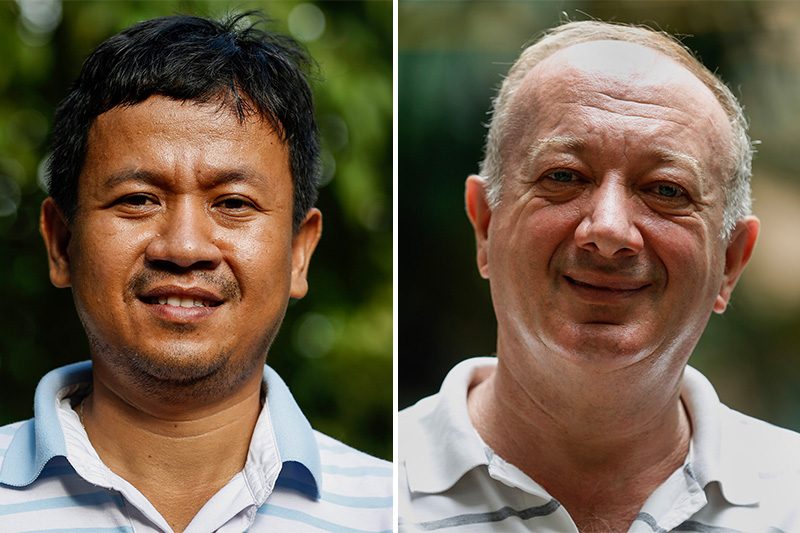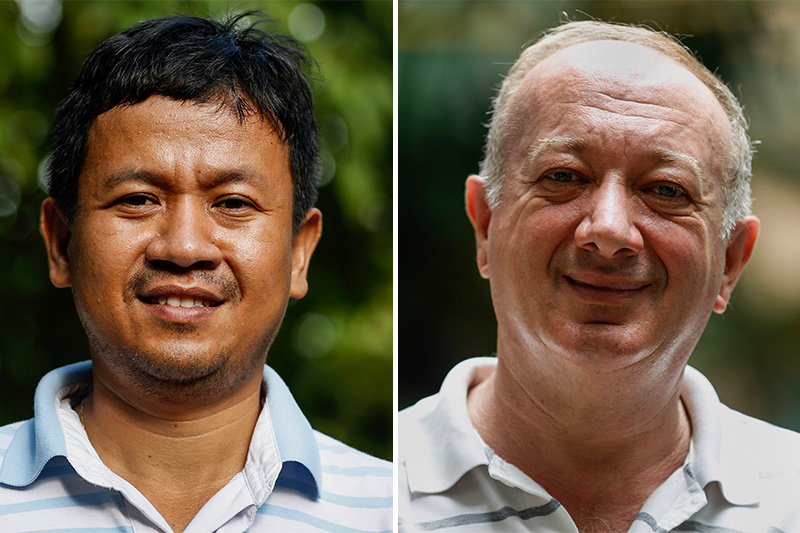After nearly a decade of painstakingly listening to Cambodians —from people in cafes in casual conversation to academics opining in their fields—a pair of linguists has produced a definitive guide to Khmer pronunciation.
For good measure, Jean-Michel Filippi and Hiep Chan Vicheth have also captured Phnom Penh’s unique colloquialism, where a bowl of noodle soup is katieu, not kuytieu, and a population of 2 million has impacted spoken Khmer in myriad ways.

The “Khmer Pronouncing Dictionary,” which offers a guide to enunciating both formal and informal Khmer—specifically that variation spoken in the capital—is being made available today on the website for Unesco, the U.N. agency dedicated to cultural protection.
The effort to capture Khmer took the better part of 10 years because Mr. Filippi and Mr. Chan Vicheth had to virtually start from scratch. Formal Khmer pronunciation had never been systematically written down, so they had to begin by identifying the standard before they could speak of Phnom Penh phrasing.
As the authors write in their introduction, a standard form of Khmer language began to emerge in the 1950s, but works published on pronunciation in the 1950s and 1960s were based on the Khmer spoken by Cambodian scholars, such as philosopher Keng Vannsak, linguist Long Seam and Chuon Nath, the supreme patriarch of the Mohanikaya Buddhist Order and a Khmer literature master.
“This highly idealized Khmer language based on the pronunciation of an academic authority had but little if any counterpart in reality,” Mr. Filippi and Mr. Chan Vicheth write.
The two linguists wanted to avoid this and focused instead on the Khmer language as commonly heard in the 21st century.
To set the norm, they researched the Khmer spoken by today’s educated Cambodians, notably academics and those with university degrees working in all fields, making sure to include men and women of all ages. The participants were asked to read and answer questions on more than 2,000 words and provide their opinions on Khmer-language recordings from formal and informal contexts.
While this was painstaking work that spanned years, defining Phnom Penh’s dialect proved even more of a challenge, Mr. Filippi said in an interview.
The researchers listened to some of the same people as before and to many Phnom Penh residents during casual conversations, concentrating on the way they pronounced words and discretely noting their observations.
“It was much more difficult and took a great deal more time,” Mr. Filippi noted.
Since Phnom Penh is Cambodia’s political, business and media center, people may come to confuse the Khmer spoken in the city with the country’s standard pronunciation, Mr. Chan Vicheth said in an interview.
“The Phnom Penh dialect is more heard than others and we wanted to stress that this strictly is Phnom Penh dialect,” he said. Other parts of the country, such as the Battambang and Siem Reap regions, also have their own regional dialects.
For example, there are four “back vowels” used in Phnom Penh—similar to the vowel sounds in the English words “book,” “soul,” “pot” and “are,” Mr. Filippi explained, while there are only three back vowels in the Khmer spoken in the Battambang and Siem Reap regions.
Phnom Penh colloquialism may also reflect—more than anywhere else in the country—the upheaval of the last 50 years.
The capital’s residents today are not typically those who lived in the city when the Khmer Rouge evacuated the population after seizing power in April 1975, Mr. Filippi said.
Four years later, as Vietnamese forces accompanied by a Cambodian contingent arrived from Vietnam through Mondolkiri province and toppled the Pol Pot regime, thousands of displaced Cambodians converged on Phnom Penh, many of them farmers who had never lived in an urban environment, he said.
As the Khmer Rouge dashed to the Thai border in January 1979, they tried to take with them people living west of Phnom Penh, causing tens of thousands to flee to Thailand. So those who came to Phnom Penh after their defeat mainly came from the north and the east, especially from Kompong Chhnang, Kandal, Kompong Cham, Prey Veng and Svay Rieng provinces, Mr. Filippi said.
With the city inhabited again, a standard pronunciation slowly emerged, fashioned by those new residents.
“So the dialects from places such as Prey Veng, Svay Rieng…and Kompong Cham provinces gradually created a language. Communication gradually created a pronunciation. It is central Phnom Penh pronunciation today,” he said.
Mr. Filippi, born on the island of Corsica in the Mediterranean Sea, teaches Khmer linguistics and language philosophy and phonetics to master’s degree students at the Royal University of Phnom Penh. Also an anthropologist, he has lived in Cambodia since the mid-1990s, with forays to China and Taiwan for Chinese-language studies. His work has included researching and publishing a book on Cambodia’s minority languages, including the Poa minority of Preah Vihear province.
Originally from Siem Reap province, Mr. Chan Vicheth was a student of Mr. Filippi who completed his master’s degree in linguistics in France. He currently teaches French linguistics and phonetics at the Royal University’s Institute of Foreign Languages and has worked with Mr. Filippi on several research projects.
In their dictionary, each word is listed four ways—in Khmer script, in the Latin alphabet and each word’s formal and Phnom Penh variations written beneath in the international phonetics alphabet.
The free online version of the pronunciation guide, found at www.unesco.org/phnompenh, includes an introduction in Khmer, English and French, and will also be available in book form at public university libraries.
Today, the Khmer language faces a new threat in an era of widespread internet access and a global outlook among middle-class youth, who often pepper their Khmer conversation with English words, Mr. Filippi said.
As middle-class families send their children to English-language classes or even schools, a generation of Cambodians may become adults with limited knowledge of their national language, he said.
“This could become a big problem for Cambodia,” Mr. Filippi added.




